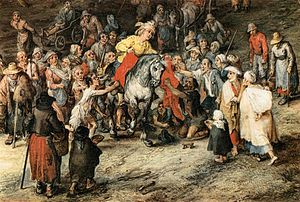*
Jesus Tradition in the Acts of the Apostles
.
COVERED IN THIS POST:
- Ehrman accepts Acts as reliable history
- Acts as a second century product
- Judas treated as an historical figure
- More Aramaic tradition?
- Quoting Paul quoting Jesus
- The speeches in Acts
- Adoptionism: Jesus becomes God’s son
- Tracing the sequence of ideas about Jesus
- Syncretizing two separate movements
.
* * * * *
Canonical Sources Outside the Gospels and Paul
(Did Jesus Exist? pp. 106-113)
.
In the midst of addressing the testimony to an historical Jesus in epistles both canonical and outside the New Testament, Bart Ehrman devotes several pages to the “Jesus Tradition in Acts.” In introducing Acts he fails to enlighten his readers that there is great uncertainty within mainstream scholarship over the historical reliability of the content of this document. Furthermore, he accepts without question that the author of Luke was the author of Acts, and thus what was known to the former was known to the latter.
Is Acts reliable history?
Ehrman fails to question any aspect of this ‘history’ of the spread of the faith. He treats everything from Acts as though it were part of known Christian tradition, and as reliable as anything else. . . .
— No matter that the descent of the Holy Spirit at Pentecost is nowhere mentioned in the epistles (despite their focus on inspiration and revelation).
— No matter that the figure and martyrdom of Stephen is nowhere attested to outside Acts.
— No matter that in Acts the settling of the issue of requirements for gentile converts is presented in an Apostolic Council which the authentic Pauline letters seem to know nothing about.
— Nor is the dramatic shipwreck episode at the end of Acts mentioned by early writers who talk about Paul, inviting us to see it as sheer fiction, emulating a popular element in second century Hellenistic romances. (The so-called “we” passages, often alleged to be from a Lukan journal, have also been identified as a common literary feature in recounting travel by sea, such as is found in earlier parts of Acts surrounding such travels.)
When and why was Acts written?
There is also no discussion about the dating of this document.
Ehrman places it in the most traditional position, some time in the 80s of the first century, shortly after the most traditional dating of the Gospel of Luke, c.80 CE. No mention is made that much critical scholarship has moved toward a date at least a couple of decades, sometimes more, into the second century (Townsend, Mack, O’Neill, Tyson, Pervo). And, of course, no mention that the first attestation to Acts comes around 175 in Irenaeus, with possibly an allusion to it a decade or so earlier in Justin. That such a ‘history’ could have lain unnoticed for so long if it had been written a century earlier (or more, for those who maintain it was written before Paul’s death), is not considered worthy of note.
As long ago as 1942, John Knox (Marcion and the New Testament) presented a compelling case that Acts was not written until the 140s or 150s, an ecclesiastical product to counter Marcion’s appropriation of Paul in which he used the letters to demonstrate that Paul operated independently of the Jerusalem apostles and with a very different view of Jesus.
Thus, Acts was written and designed to show the opposite, that Paul immediately upon his conversion subordinated himself to the pillars and subscribed to their teachings, lock, stock and circumcision. Which is why the speeches in Acts, clearly composed by the author, show the identical content between those of Peter and those of Paul. (Neither does Ehrman discuss the considerable discrepancies between Acts and the Pauline epistles.)
Independent witnesses to Judas’ death
Ehrman hardly covers himself in glory with his treatment of the figure of Judas in Acts. According to him,
the author of Acts has access to traditions that are not based on his Gospel account so that we have yet another independent witness. (DJE? p. 107)
Independent from whom? Was Luke the author of the Gospel “independent” of Luke the author of Acts? It seems that for Ehrman every saying or anecdote which can be found nowhere else, or fails to agree with some other version of that saying or anecdote, constitutes an “independent witness” to the historical Jesus. Continue reading “17. Earl Doherty’s Response to Bart Ehrman’s Case Against Mythicism – Pt.17”

